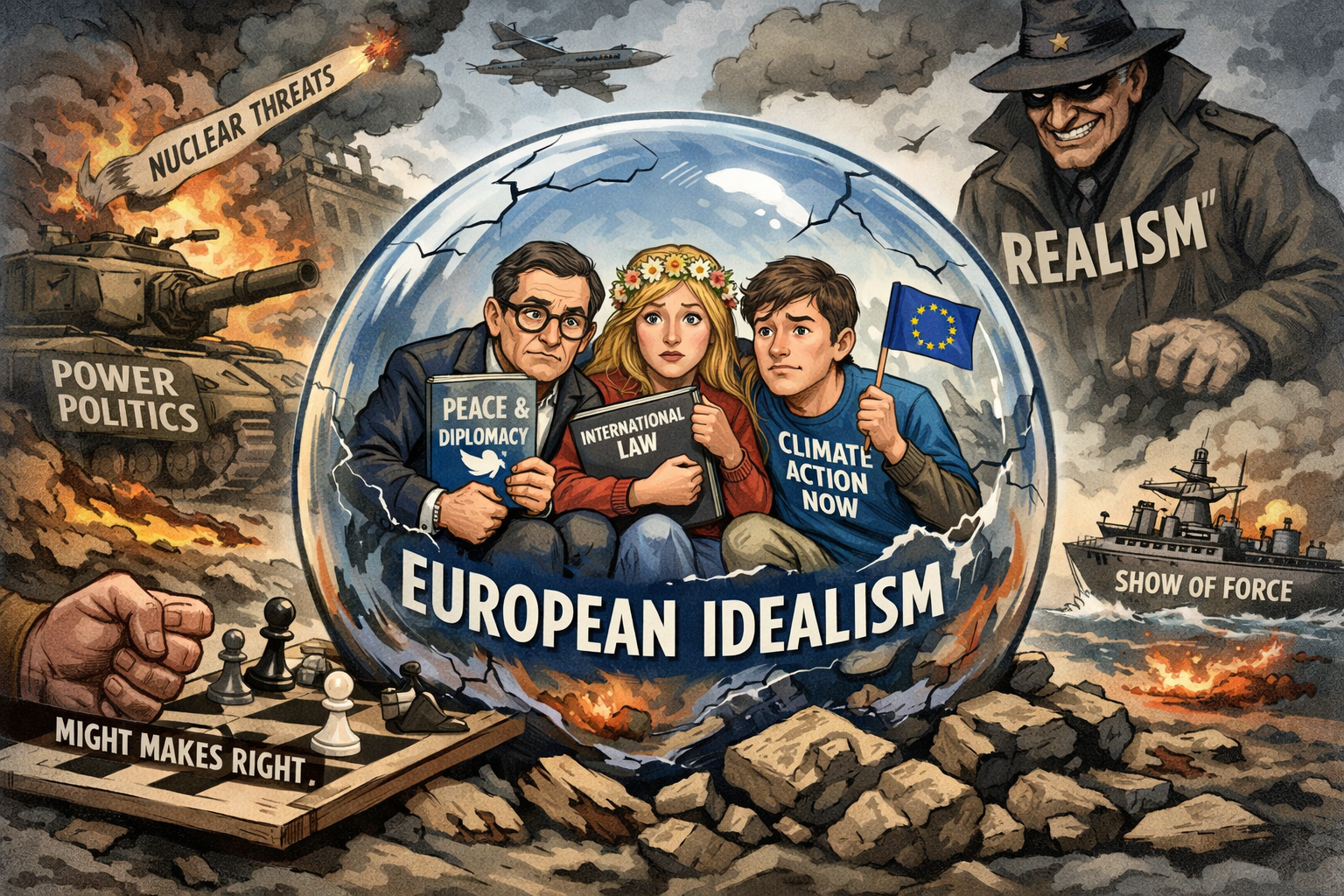Herder vs. Fichte and the fight for the soul of nationalism
Imagine a time of globalization, modernization; of decadence and alienation. Imagine living in a country where the mother tongue is devalued at the university. Where elites pride themselves on declaring stronger loyalty to foreigners than to socially inferior compatriots. Where the universalisms of the elites most of all benefit themselves.
Envision, if you can, a young man who longs to be part of the new elite. Who travels to the metropolis, ready to be refined, civilized, reconstructed. And imagine that the young man discovers that familiarity with a foreign culture can not only breed familiarity, but also disgust.
The year is 1770 and the 26-year-old organist son Johan Gottfried Herder from a sand heap in today’s Poland has already studied philosophy under Immanuel Kant in Königsberg, he has all served as Lutheran pastor among the German congregation in Riga and on his way from Paris to Strasbourg, he meets the young Goethe, an important meeting if there ever was one.
For, this meeting is Sturm und Drang. ‘Struggle and longing’ is the epitome of a revolution of the mind that will destroy the aristocratic Europe and prepare the ground for the nation-states of the bourgeoisie. Herder studied under Kant, but Kant’s friend and colleague Johann Georg Hamann was obviously a more important influence. A biographer writes:
“Kant made reason the rule of his life and the source of his philosophy; Hamann found the source of both in his heart. While Kant dreaded enthusiasm in religion, and suspected in it superstition and fanaticism, Hamann revelled in enthusiasm; and he believed in revelation, miracles, and worship, differing also in these points from the philosopher.”
Hamann believed that humans are motivated more by what we believe more than by what we know. Hamann should have advised young Herder to “think less and live more”. Goethe, who gives credit to Herder for stopping writing ‘dehydrated classicism’ and becoming a populist in a poetic sense – by writing for the commoners in their own language.
It was during his stay in Paris that Herder found that French civilization, with its global pretensions, was hollow, permeated with a varnish of manners, dubious truths and the urge to ridicule simple truths. He felt an almost physical urge to escape the philosophical sophistry that placed abstracts over physical reality.
“Our gentle, pleasant and necessary bonds have been dissolved by a shameless hand, while those of us who do not live in Chateu de Fernay [i.e. Voltaire] have not been given anything in their place.” Herder saw the contours of a modernity that fragment human communities. Michel Houellebecq has built an authorship on this insight.
In his writings from Paris, we meet a Herder who feels personally affronted by snobbish French intellectualism purporting to tell people how to live their lives. Herder was sceptical of building societies on the abstract and ‘universal’ truths which, upon closer inspection, were neither one nor the other. Instead, he found the answer in culture.
Herder encouraged the Germans to throw up the “slime from the Seine”. A proverb at the time had it that one speaks Latin with God, French with women, English with men and German with your horse. Herder thought Germans should aspire to be more than second rate French.
He believed that everyone thinks most clearly in their mother tongue. For Herder, language is the essence of a people. “The very first words we garble,” he declared, “are the cornerstones of our knowledge.” Therefore, he fought to stop the colonization of German universities. He saw the dominance of the French tongue as reducing Europe to a “graveyard of cultures”.
Sturm & Drang’s emphasis on the subjective inspired students who with their long hair, hipster fashion and experimentation with sex and drugs became the counter-cultural icons of the late 1700s. The young nationalists cultivated the subjective experience over strict rationality, rough Germanity over French sophistication.
Herder brings a new focus on cultural differences. Charles Darwin famously divided the academy into ‘lumpers’ and ‘splitters’. Lumpers like to group things into ever larger categories, while splitters divide things into smaller groupings. Lumpers look for what unites, splitters on what sets apart.
Herder is keen on what makes different cultures distinct. Partly because he views man as a herd animal, where the tribe is the framework for the individual to attain his potential in the Aristotelian sense. He thus broke with French philosophers such as Racine and Corneile who declared fellowship with all and sundry based on supposed shared identities.
Isiah Berlin called understanding what it means to belong to a group for ‘Herder’s populism.’ Herder sees society as an organism, a living whole. But he was, according to Berlin, strongly influenced by the natural sciences. Herder believed in progress, but he did not share the notion that humanity is progressing on a broad front, driven by rationality and knowledge.
Herder’s loved the nation, but not the state. “Nature creates nations, not states,” he wrote. Herder’s German nation was divided into some 3000 principalities. His native Prussia was characterized by faded autocracy and habitual militarism, perhaps an example of what he called the state’s “dehumanizing potential”.
Hardeners love the communities that grow from below, not the ones pushed top down. He rages against imperialism, when a society wipes out another’s culture even if it is the name of progress. Herder is sure that those who force their way of life on others guarantee that their victims will rise up against them and use their own slogans, methods and ideals against themselves one day.
The idea is that ideals and institutions that are progressive, good in the context in which they emerged, can be poison if they are transplanted into a foreign body. Historian Arnold Toynbee pointed to communism as an example of a western idea that first poisoned the Russian empire and then transformed into an anti-western project.
Herder is a thinker of our time. Francis Fukuyama thinks Herder “is not sufficiently read in the English-speaking world” and rightly concludes that the discrediting of Herder by the anti-nationalists of our time is grossly unreasonable. Shepherds shared the Enlightenment view of humanity as one and of a human dignity that dwells in equal measure in all human beings.
This basic humanism made Herder an early opponent of slavery. He also believed that the quality of a culture could be assessed according to how women are treated. All experts seem to agree that Herd’s starting point is that of a Kantians, cosmopolitan and a pacifist.
Johan Gottlieb Fichte also studied under Immanuel Kant in Königsberg. Both internalized Kant’s philosophical universe but unlike Herder, Fichte experience the Prussian defeat of Jena in 1806. Herder did not live to see the revolution overthrowing the German patchwork of statelets and French civilization being offered at the end of a bayonet.
In 1791, 29-year-old Johann Gottlieb Fichte travelled from Saxony, through Silesia to Warsaw, hoping to take up a teaching position. “I walked a lot of the way on foot,” writes young Fichte. The diary is useful, not least since Fichte’s philosophical works are almost unreadable.
“Only one man ever understood me, and he didn’t really understand me.” The quote often attributed to Hegel was, in fact, uttered by Fichte, perhaps in reference to Kant. Young Fichte’s diary charts the transitions of cultures. Poland does not start at the border.
Fichte is fascinated by how German culture change and yet remain the same. The walk from Dresden to Warsaw gave Fichte the chance to reflect on the myriad of little things that conspire to give the feeling of being near or far from home.
Fichte notes the small differences from the refined Saxony and the rougher Prussian Silesia and how the German and Polish influences appear in changing mixtures conditions until he has one day come to Ponnichowo, a village where the last remnant of German culture is gone. He is in Poland.
Higher education is often a handicap when it comes to instinctive insights. In his ‘speeches to the German nation’, Fichte pointed out a historical fact – that national identity and patriotism is a strong and positive force. Stronger than political ideology, stronger than religion, one might add.
Although it is common to pretend that all peoples are very similar, anyone who has travelled will know that there are great differences between nations, differences in perspective. What is perceived as good, healthy, right and important varies from country to country.
The culture binds us to those who have gone before us, to our fellow human beings and to the generations to come. The significance of the small differences is that the fragments are not just fragments, they are distinctive fragments – Fichte finds his Germany in the “eagle, whose powerful body rises to the heavens and hovers on strong and well-practiced wings”.
The 1968 icon Wolf Biermann will later use the same image on Germany in the song about the eagle the “Prussian Ikaros”. He saw the Prussia reborn in the GDR. Historian Fritz Fischer was to develop this into the thesis as the German ‘Sonderweg’, the distinctive path that sets the Germany on a course towards 1914.
Fischer draws this path to Luther and the Reformation, but it can be argued that this theory appears most convincing in the French occupation that necessitates a German nation-state, legitimizes Prussian militarism, and unifies Germany under most authoritarian of the German states.
The nation state is the natural consequence of Herder’s nationalism. The meeting between the nation and the state created the nation-state, and the nation-states created the international system. Democracy was born along with the national feeling, by both tying power to the people and proclaiming a fundamental equality between individuals.
And out of this springs the national culture that changes, but still has the ability to remain the same. Fichte, who, like Herder, was part of the first generation of German “commoner students” compared the folk culture with the oak tree: “It was rough and tough with deep roots, mighty branches a lush foliage destined for long life” , as Geir Uthaug writes.
Oak has a very special connotation in Germanic languages. There is a scene in the new movie about JRR Tolkien. A professor will explain to young Tolkien the importance of language for culture. He tells of a boy who learns the word for the tree, associates it with the thing. He plays in the tree, climbs among the branches. When he becomes a man, “he marries under it … and rides past it on his way to war.”
At every step of his life’s journey, the tree is rooted in his life, until he is finally buried under it. Now, and only now, says the professor, can we understand that all of these experiences support our understanding of a single word: Oak. Eik. Eich. The words of your culture fall into the well of consciousness and give a deep echo. Without the backstory, a word has no meaning.
“Every nation” claims Herder “speaks the way it thinks and thinks the way it thinks”. The notion that language shapes thought should then find its outlet in Ferdinand de Saussure’s linguistics where the linguist discovers that what is green in one language is grey in another.
In the 19th century, the nationalists were the standard bearers of liberalism. Nationalists were seen as democratic heroes, the embodiment of everything that was progressive and fair. This is no longer the case. The rupture between the liberals and nationalism was deep.
Herder’s nationalism is something quite different from the value identities of today. The anti-nationalism that characterizes the liberalism of our time is a source of strength, but also of weakness. For many, arguably most Europeans, the nation is more meaningful and more valuable than the promises of a post-national world.
It was as diagnosis of alienation that is the companion of modernity that Herder became an intellectual superstar, the Jordan Jordan of the time. Herder realized – before Marx – that a feeling of being separate from the world, from one’s job and from one’s own self is a black mark against Western modernity. Nationalists often sought to overcome this by focussing on enemies.
It is nevertheless unreasonable to put this in front of Herd’s door, as little as anyone in the 18th century could imagine the cavalcade of events that ended in the world wars at the end of Fritz Fischer’s ‘Sonderweg’. Herder’s nationalism is tolerant, a celebration of what unites us in the largest groups capable of creating an ‘us’ – the nations.
Today’s anti-nationalists conveniently forget that they live in a world created by nationalism, that nationalism has given more than it has taken. Our world is made up of nations, given the form of nation-states which have given us the government of the people, the welfare state, the rule of law and civil rights.
It is doubtful whether the logic of the nation state can live on without the nation state. Herder saw that those who want to liberate us from traditions, from culture and history most often only succeed in freeing themselves from their duties towards actual compatriots in favour of a universal humanity that does not exist besides those who claim to speak on behalf of it.
Herder’s relevance to our time is that the upsurge in identity politics we see across the West is being torn by the same impulses that led to nationalism. In a similar way, we see that nationalism is the answer to liberalism’s erroneous data – the ever increasing amount of developments that did not go as the globalists had imagined.
For man is not rational, not only. We have a heritage that anchors us, which makes sense to us. The postmodern urbanism of globalists may be a good place for ideals, but for individuals it has proved to be a barren, alien place. Just look at the culture our culture produces, it is as if we have been occupied by a civilization that detests us.
Now that we have ended up in a situation where the people are facing the elites all across the West. Both tend to who see the authoritarian tendency in others that they do not recognize in themselves. The national conservative wave that is currently fuelling the conservative movement is provoking enthusiasm, but also turmoil.
Classic conservatives issue starker warnings agains the dangers of national conservatism than they did when liberals set out to offer the world democracy through occupation, or when they lay Europe open for uncontrolled immigration or supported an EU that is a dagger aimed at the heart of the nation-state – are we to believe Harvard economist Dani Roderik.
When smaller languages like Norwegian are dying as a university language, when our parliaments have renounced decision-making to the point where they are reminiscent of provincial assemblies, when our intellectuals agree that our culture does not exist … then it is tempting to smile wryly at the warnings of the perils of national conservatism.
And yet the warning is timely. For national conservatism has a problematic legacy and although history never repeats itself, it is worth noting that it is the militaristic Russia that is today the standard bearer of national conservatism. The difference between Herder and Fichte is small, but important: The difference between intolerant and tolerant nationalism.
Published in The American Interest on 26.11-2019




